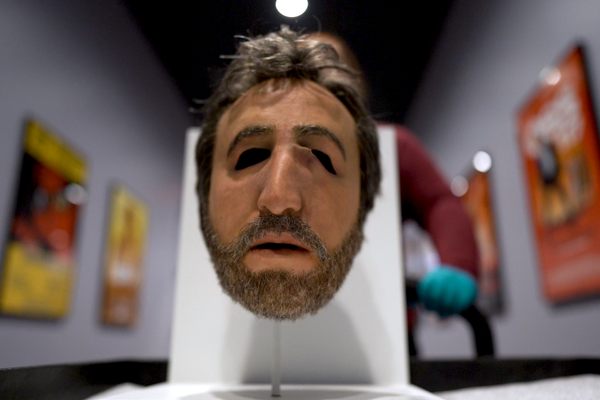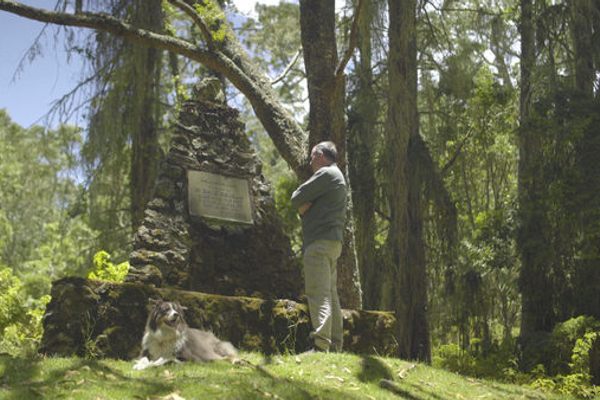The Tragedy of Newcomb Mott, Who Thought He Could Walk Into Soviet Russia
Young and naive, he just wanted his passport stamped.

When Newcomb Mott flew into the small airport in Kirkenes, Norway, in 1965, nothing had ever truly gone wrong in his life.
He was 27 and tall (over six feet), with notably red hair (though it was starting to recede from his high forehead). He was an American man from a well-off family. He had gone to college at Antioch, in Ohio. During his college years, he tried his hand at being a forest ranger in the Berkshires, a copy boy for the Toledo Blade, an assistant in the press gallery of the U.S. House of Representatives, and an elementary school teacher. At the time he landed in Kirkenes, he was working as a college textbook salesman. He’d lived for a time in Mexico, and visited close to 20 other countries. He dreamed of becoming an editor.
Mott was, as one U.S. ambassador would later describe him, “a kind of innocent abroad,” who had come to this isolated place, north of the Arctic Circle, on a whim. He had a confidence characteristic of young, educated, American white men in the 1960s—a feeling that everything would probably work out, because, the great majority of the time, everything did. But when Newcomb Mott illegally crossed the border into the USSR in 1965, aiming to collect a new stamp on his passport, everything did not go right for him.
Within a year of crossing the border, Newcomb Mott was dead, killed either by fellow prisoners or by government agents, although the Soviet government officially ruled his death a suicide. Under different circumstances, he might have been given a fine and set free after a few days or weeks. But borders are fraught places, where the rules can shift quickly and individual choices, the power of the state, and politics can turn small mistakes into tragedies.

As a purveyor of academic textbooks, Mott got summers off, and he had been traveling around Scandinavia as he neared the end of his trip. He’d been planning to take a bus from Finland to a different town in Norway, but a Finnair employee convinced him to fly to Kirkenes, a small Lapland town just miles from the Soviet border. Earlier in his trip, Mott had looked into going to the USSR, but found it too complicated. Now, with the border so close, the allure of setting foot in one more country tempted him.
There wasn’t much to see in that isolated part of the world. Kirkenes, a pretty enough place in summer, was full of neat, bright houses, a charming shopping street, and not much else. Mott didn’t have enough time to take a boat across the nearby fjord, and he started considering the possibility of visiting Boris Gleb, a tourist outpost across the border. There wasn’t much to see there, either—just a low-slung building where Norwegians went to buy cheap vodka and, nearby, a 17th century church named after Boris and Gleb, two princes who were murdered by their brother in the 11th century and later canonized by the Russian Orthodox Church. But at minimum, he’d be able to say he had visited the USSR.
The small stretch of border between Norway and the USSR, just 121 miles, had only recently been opened up, in a limited way. Norwegians were allowed to cross without a visa, an enticement for them to spend their foreign currency on vodka and other goods stocked at the Soviet outpost. (There was some implication, too, that perhaps Boris Gleb might attract Communist sympathizers looking to get into espionage work.)
But Americans still needed a visa. That’s what Mott was told at the hotel where he was staying, but as DeWitt S. Copp reported in his 1968 book, Incident at Boris Gleb, he decided to try to cross the border anyway. If the Soviet border guards wouldn’t let him through, “he would then ask them to stamp his passport to prove that he had been there, and so be one up on his brother Rusty, with whom he had a running contest on countries visited,” writes Copp. Either way, Mott intended to be back in Norway by the afternoon, to catch his flight out.
The next morning, he got on the bus for Boris Gleb. Mott didn’t speak either Norwegian or Russian, and that was the beginning of his difficulties that day. Instead of taking the bus to the border, he got off when the bus driver opened the door, pointed down a road, and said “Boris Gleb.” He still might have ended up at an official border crosspoint, but instead, through a combination of misunderstanding a Russian sign and miscommunicating with two Norwegian locals, he ended up at an unguarded part of the border and decided to cross. A short time later, he arrived in Boris Gleb, cheerfully greeted the guards there, showed them his passport, and was immediately apprehended.

Mott never denied that he had broken a law by crossing the border, but he did maintain that he never intended to do anything illegal. Even after he was detained, he was optimistic that the problem would soon be sorted out. He wasn’t wrong to think so: although there was no way for him to know this, there had been a couple incidents in the past, one involving a German and another an American, where the illegal border crosser had been let go relatively quickly. But that would not be Mott’s story.
The first Soviet authorities to question Mott asked him repeatedly: Do you belong to the CIA? Do you know anyone who does? But they seem to have given up the idea rather quickly that he might be a spy. (American papers were less convinced: an Amherst newspaper was still arguing that Mott may have been a member of the CIA after he had died.) Instead, they were interested in trading him for one.
A couple of years before, Igor A. Ivanov had been arrested for espionage and, by the end of 1964, convicted of the crime. The Soviet government had tried once, unsuccessfully, to trade an American detained in the USSR for Ivanov; with Mott, they saw another opportunity. The U.S., though, wasn’t interested in that sort of trade. From the government’s perspective, trading Ivanov for Mott would give the Soviet government an opening: every time they wanted one of their imprisoned spies shipped back to the USSR, they would only have to arrest an American on some pretense and threaten to punish them harshly.
Even outside the State Department, which was helping Mott as he was brought to trial, the U.S. government was paying attention to the case. The CIA was, at the very least, collecting news coverage and likely working other sources to find out more. The case was included in at least one intelligence bulletin and one presidential intelligence report, and in both cases the version of the documents now available to the public have had information withheld, either because releasing it would reveal an intelligence source or harm the U.S.’s relationship with a foreign government.
Despite the State Department’s efforts to have Mott released, his case went to trial after he had been detained for two months, and he was found guilty. The punishment for illegal border crossing was one to three years in prison; Mott was sentenced to 18 months in a corrective labor camp. “He wept at the verdict,” UPI reported, but when he was sentenced, reacted “without any display of emotion,” according to the AP.
Mott had been kept in a prison not far from Boris Gleb while his case was appealed, but in January he was put on a train to be transferred to a labor camp. He may have known he was in danger: in his book, Copp argues that some unusual passages in Mott’s last letter were intended to try to communicate a threat to the State Department. He died on the train: the Soviet government reported his death to American diplomats as a suicide. But two autopsies, one after his parents were able to recover his body, showed more than 60 wounds on his body. He’d been stabbed to death.
It’s never been clear exactly who killed Mott and what the Soviet government’s involvement was.* One American writer suggested that perhaps the Soviets were punishing America for refusing to trade Mott for Ivanov. Another thought that, even if Mott were not a spy, perhaps he had inadvertently seen a Soviet intelligence operation he should not have. Whatever the reason for his death, it’s a cautionary tale. Explore, yes, by all means, just not near politically fraught international borders, even if you are a white man from America, with all the privilege in the world to marshal.
*Update: A reader with a connection to the Mott family writes that, after the fall of the Soviet Union, they were able to access the official Soviet report on Newcomb Mott’s murder by another prisoner on the transport train, who wanted Mott’s boots.

















Follow us on Twitter to get the latest on the world's hidden wonders.
Like us on Facebook to get the latest on the world's hidden wonders.
Follow us on Twitter Like us on Facebook